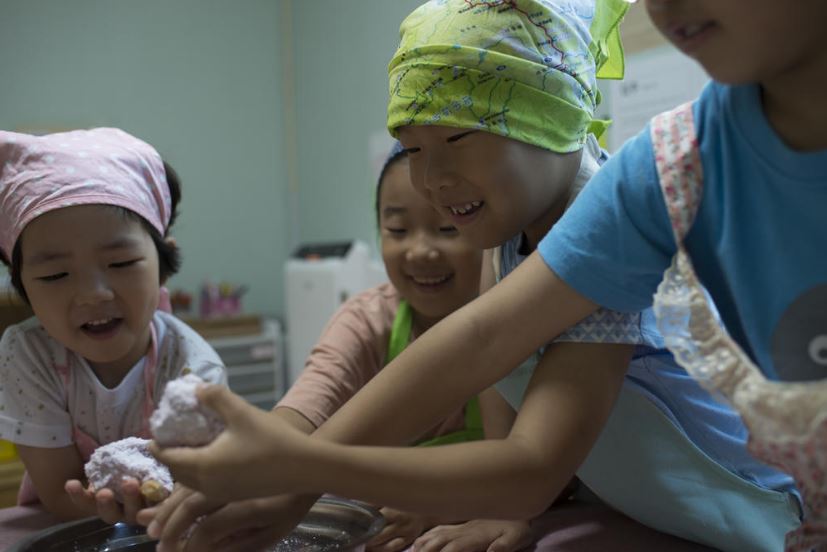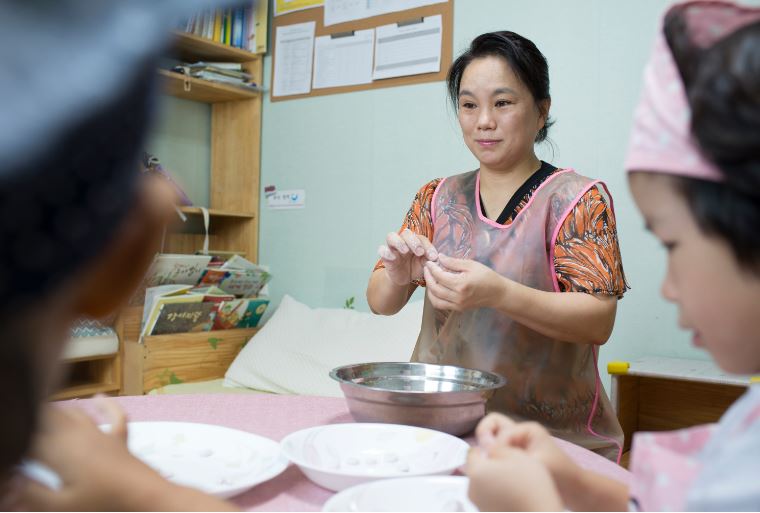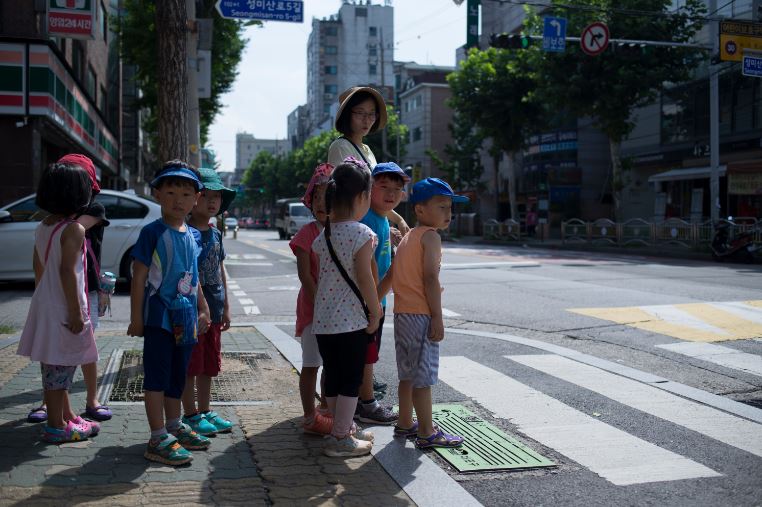[Singapore_Today] Daycare centres run by parents gaining in popularity in South Korea
Daycare centres run by parents gaining in popularity in South Korea

A small but growing number of parents are turning to such parent cooperative centres, in search of a safe environment for their children. Photo: Hilary Tan
SEOUL — Many young children experience some form of separation anxiety when leaving their parents for the first time, but South Korean Nancy Park, 37, knew her daughter’s reluctance to attend daycare was not as simple as that. The civil servant suspected something was amiss when her then two-year-old daughter dreaded going to the daycare centre. She said teachers were not able to tell her about her daughter’s daily activities and progress. She asked to see the CCTV footage to identify the cause of her daughter’s daily tantrums before school. When the centre said no, she withdrew her daughter, after less than a year there. She then turned to Woori Nursery School, a parent cooperative childcare centre run by parents and teachers.
“It’s very safe here and the teachers are very good. I feel like I can trust the teachers; they give me good feedback on how my daughter is doing and I can visit her all the time,” said Mdm Park. “My daughter feels like this is her home.” A small but growing number of parents are turning to such parent cooperative centres, in search of a safe environment for their children. The centres are founded and run by groups of like-minded parents who believe in communal parenting, and they hire specially trained teachers to run the centres with them.
Teacher Kim Hee Chul showing children how to prepare im ja soo tang, a traditional Korean dish that is usually eaten in summer. This is part of their cholgi curriculum, which is a seasonal program. Photo: Hilary Tan
UPDATED 30 DECEMBER, 2017
There are now 69 such parent cooperative childcare centres, up from about 20 centres a decade ago, said the Communal Childcare and Communal Education Organisation, which serves as the consulting body for these centres and has a training programme for teachers. The centres keep their class sizes small, with about eight to 12 students per level. Transparency and trust are key, with parents taking on administrative roles and even joining in the centre’s activities.
“Other daycare centres have CCTV cameras, but there aren’t any here so the teachers can work in a better environment,” said parent Choi Hye Jeong, 35, whose six-year-old son and five-year-old daughter attend a parent cooperative childcare centre. “Because of the smaller class, the teacher knows a lot more about each individual, so there is a deeper relationship between them and the children,” said Ms Choi. In comparison, privately run daycare centres — which make up more than 80 per cent of all daycare centres — have come under scrutiny in the past two years, with numerous media reports of child abuse and corruption.
These centres are typically run by independent operators or organisations, some of which are for profit. “Especially in Korea, private daycare centres are not as reliable,” said Ms Jung Young Hwa, secretary general of the Communal Childcare and Communal Education Organisation. Parents cannot be sure how their children are being treated by teachers after they leave them there. And they have no say on what is taught. But the cooperative daycare system is for parents who want to be involved in their young children’s education. “And we think that is important,” she said.
The first centre was set up in the 1990s with the goal of communal parenting, driven by the philosophy that it takes a village to raise a child. The movement was also a response to a growing loss of neighbourliness, and the centres served as a social space for the community to come together. The centres have no fixed curriculum. They encourage play and community spirit. Some children graduate without learning the Korean alphabet, a must in other preschools. They call teachers and other parents by nicknames and are allowed to use the more informal form of Korean. This allows the children to form deeper relations with the people around them, said Ms Ryoo Mi Hyun, 50, a teacher at Woori Nursery School, one of the first parent cooperative childcare centres established in Seoul.
“This cooperative system prepares the children to live in the competitive world,” she said.
A teacher from the Woori Nursery leading children on their daily field trip. The field trips are a hallmark of the parent cooperative nurseries. Photo: Hilary Tan
Parents like the new thinking: it encourages children to enjoy learning and delays the immense pressure they are likely to face in elementary and middle school. In May, a university study comparing third-graders in 16 countries found Korean third graders were the least satisfied with their grades and their relationships with teachers. “The main thing here is my child does not compare himself with another. You can do maths, but I can do this instead; that’s the attitude I want my child to have,” said Ms Lee Jae Hyung, 45, whose five-year-old son is at a parent cooperative childcare centre. Children also get a say in what they want to learn, said parent Kwon Kyoung Hee, 38, noting that at other daycare centres or nurseries, kids may be forced to complete activities against their will.
The businesswoman’s only daughter has been attending a parent co-operative childcare centre for the past four years. Parents and teachers also prepare their children for the “stressful education” that is to come, said Ms Kwon. They hold discussions on how to minimise their children’s stress levels. But she said the system is not for everyone, as parents must subscribe to the centre’s philosophy of communal parenting. “Some parents don’t like this. There are many responsibilities and they have to do so many things,” said Ms Kwon.
Parents are expected to look after one another’s children and help with chores, and not everyone may be prepared to do so. Housewife Lee Young In, 36, said she does not plan to send her younger daughter to the cooperative centre where her son is enrolled. “It takes too much effort,” she said. Apart from her duties in the finance department, Ms Lee has to clean the centre every two months, attend monthly meetings and help out with other term-time activities. Price is another deterrent. Monthly fees at the centre are around 300,000 won (S$357). There is also a one-time refundable deposit of about 7.5 million won. On the other hand, most public and privately run daycare centres are free as fees are heavily subsidised by the government.
Still, Mdm Park feels the cost is worth it. The benefits of a parent cooperative childcare centre can extend to parents too, she said. Fostering close relationships with fellow parents and interacting more with her children has helped her appreciate her daughter more. While she used to regularly compare her with peers, Mdm Park now focuses on her daughter’s strengths. “It was not easy because it was my habit,” she said. Now she sees her daughter as an individual, not someone in competition with others.
Cara Wong, a final-year journalism student at Nanyang Technological University’s Wee Kim Wee School of Communication and Information, did this report as part of the school’s Going Overseas For Advanced Reporting module. This is part of a series on South Korea that TODAY is running.

